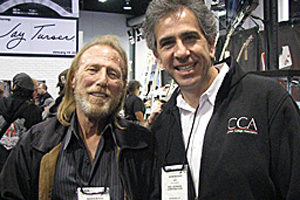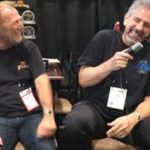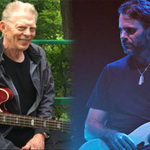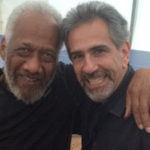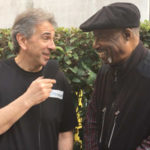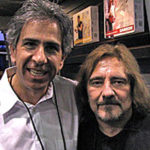Legendary Tower of Power bassist tells FBPO all about his musical upbringing, history of TOP and his signature “machine gun” bass technique!
Exclusive interview with FBPO’s Jon Liebman
July 2, 2012
Bass legend Francis Rocco Prestia is best known for his decades-long association with the iconic West Coast funk/R&B band Tower of Power.
FBPO: How would you describe your musical upbringing?
RP: I started playing guitar when I was young. I took guitar lessons, but I was the kind of guitar player that, you know, your mother would say, “It’s time to practice,” and of course I didn’t want to. I actually joined the band as a guitar player. There was a guy, Terry Saunders, that would come in and show us all the latest stuff, like Paul Revere & the Raiders, the Animals and stuff like that. Terry took a look at us individually and collectively. He listened to me play guitar and he said, “Hmm… You guys need a bass!” We all kind of looked at each other and said, “What’s a bass?” [Laughs]. We were pretty clueless, you know. That’s how I started playing bass. I went down and got a bass and that was that.
FBPO: I think you said the band, not a band. You’re not talking about Tower of Power already, are you?
RP: Yeah. I joined this band when I was 14.
FBPO: Wow! Who were your influences once you became a bass player?
RP: I came up with sounds. Back then, it was more like the Philadelphia sound, the Motown sound, James Brown, Muscle Shoals, Chicago… you know, all that. Every city seemed to have its own sound. I came up that way. I didn’t really know who the players were till much later. Obviously, it turned out to be James Jamerson, Duck Dunn, Chuck Rainey, Jerry Jemmott… you know, all those guys.
FBPO: If you were that young, you couldn’t have done too much before Tower of Power. Is that the first thing you’ve ever done professionally, musically?
RP: Yeah.
FBPO: How did the band form?
RP: Well, “Mimi” was the leader, Emilio (Castillo). Actually, in the early, early days, his brother was the leader. His brother played drums. Then that changed and Mimi became the leader. Basically, it evolved when we got hip to soul music. We really got hip to soul music! We started adding horns and it just progressed. It was the kind of music we wanted to play and, to accomplish that, we needed horn players.
FBPO: This was in the Oakland area, right?
RP: It started in Fremont, which is a little town – well, it was little at that time – north of San Jose, between San Jose and Oakland.
FBPO: You mentioned a lot of the other sounds – Philly, Motown, Muscle Shoals. How would you say growing up in northern California influenced you musically?
RP: Well, the Bay Area, especially back in that day, was really the mecca of music. I mean Bill Graham and the Fillmore and everything that was coming out of San Francisco. Santana and just a ton of bands. Sly Stone, who was also a big influence.
FBPO: You’re talking about the mid-to-late ’60s, the whole Haight-Ashbury scene, Jefferson Airplane – with Jack Casady, of course – the Grateful Dead, Janis Joplin, Summer of Love and all that stuff.
RP: All that stuff.
FBPO: You grew up right in the middle of all that?
RP: Well, not in the middle of it, but I was in that area, yeah.
FBPO: Well, that’s close enough. Quite an environment to grow up in!
RP: Yeah, it was a great place to be.
FBPO: How do you account for Tower of Power’s longevity? What’s the secret to maintaining such a strong following for so many years? Not a lot of bands can do that, even some of the really good ones. What’s your secret?
RP: I don’t know if it’s a secret. I think it’s just the music. We all enjoy playing music together. We still have four originals.
FBPO: Were you neighborhood friends, or school friends, or what?
RP: Well, Emilio and I went to school together, from junior high on. He was a grade in front of me. He was in 8th and I was in 7th, or something like that. We weren’t really friends, but we shared a class. When I became a freshman, that’s when I joined the band, the summer going into my freshman year. And then we went to high school together. Mic Gillette went to a different school, but in the same area. Skip (Mesquite) was from Hayward, which is the next town over. It was all pretty localized at that time.
FBPO: How about Doc (Stephen Kupka)? Was he one of the original guys too?
RP: Well, Doc came on around late ’67 or ’68. We changed the name to Tower of Power in ’68.
FBPO: What were you called before that?
RP: Well, we had a few names [Laughs]. We started as Extension 5, and then we were the Gotham City Crime Fighters. Then we were the Black Orpheus, then the Motowns and then we were Tower of Power.
FBPO: I like Tower of Power best.
RP: Yeah, I do too. [Laughs]
FBPO: Where did your nickname “Rocco” come from? What does it mean?
RP: It’s not a nickname. That’s my name: Francis Rocco Prestia.
FBPO: I always assumed it was a nickname.
RP: Yeah, I know. Al ot of people seem to think that, but that’s my real name. [Laughs]
FBPO: What about Geezer Butler? You think that’s his real name, too?
RP: [Laughs!]
FBPO: Rocco, how is your health these days? When I saw you at NAMM a few months ago, you looked great!
RP: I’m doing all right. I’m going through some things right now. I’ve got some kidney issues and I might be looking at another transplant. But I’m feeling pretty good. I’m still waking up. I’m still able to do the gig, you know!
FBPO: Well, thank goodness for that! I’m glad to see you pretty well back in the thick of things. What all is keeping you busy these days?
RP: Well the world is keeping me pretty damn busy! [Laughs] We’re a working band, that’s what we do, so we’re on the road quite a bit.
FBPO: What else would you like to do that you haven’t already accomplished.
RP: Oh gosh! I’d like to shoot 75 on the golf course! [Laughs] I’d like to do another solo album.
FBPO: That would be great! I remember Everybody On the Bus, back in the late ’90s. Do you write a lot of music?
RP: No, I’m not a prolific writer. I’m more of an idea guy. I do better with collaboration.
FBPO: What else do you have in the works?
RP: Well, the band’s working on a new album.
FBPO: What can you tell me about it?
RP: We’ve played about 10-12 tracks, the basics. We’re going to try to get up to around 20, 25, something like that and then pick from those. It’s just in the beginning stages, so I wouldn’t expect anything to get released until after the first of next year.
FBPO: How will the new album compare with the previous Tower of Power releases?
RP: Well, the last one we did, Great American Soulbook, was a compilation of soul tunes that we redid. This is going to be an all-original album, so we’re getting back to our old selves! There’s more input from everybody, writing-wise, more variation in the writing. It’s pretty exciting.
FBPO: Who’s in the current band?
RP: Well, we’ve got Larry Braggs singing, Emilio, Tom Politzer on tenor sax, Doc, Sal Cracchiolo and Adolfo Acosta on trumpets, Jerry Cortez on guitar, Roger Smith on keyboards, (David) Garibaldi on drums and me.
FBPO: Let’s talk a little bit about your style. You’re known for those machine gun 16th notes and your ghosting, your muting and all of those things. How did all of that come about?
RP: I don’t know how it came about. It’s just the way I play. I never gave it a lot of thought. I didn’t realize that it was anything special till we started recording and, as years went by, people started responding to it. It wasn’t a thought out thing like, “I’m trying to do this” or “I’m trying to do that.” It’s just the way I play.
FBPO: And we love it! Not just the bass players, but musicians and music fans, as well.
RP: Thank you.
FBPO: What would you be if you weren’t a bass player?
RP: Oh boy, that’s a good question. I probably would have ended up joining the military! [Laughs] I have absolutely no clue. Probably an outlaw!
